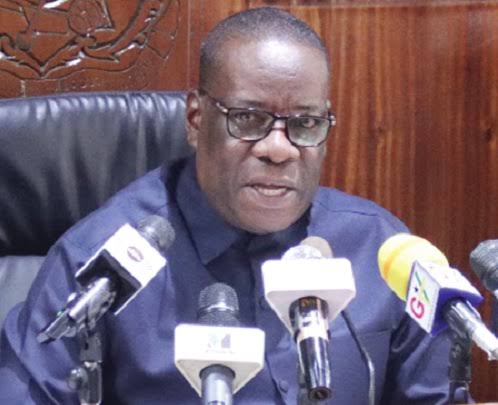Broadcasting
True financial inclusion calls for smaller markets to receive equal attention to larger ones

By John Ngari, Director, Africa MNOs at Onafriq
The potential for mobile money and digital payments to drive financial inclusion is immense. We can see this potential being unlocked on the African continent as it accounts for 70% of the world’s $1 trillion mobile money value and registered a 12% growth in mobile money accounts to 1.75 billion in 2023.

John Ngari,
This is opening a number of new opportunities for economic growth and development as more robust and connected payment networks are breaking down geographical barriers, opening up access to new markets and enabling anyone to send and receive payments quickly and easily from and to anywhere in the world.
However, these significant benefits are largely being realised and felt in Africa’s larger, and key, markets such as Nigeria, South Africa, and of course Kenya- where mobile money was first launched and popularised on the continent. While these markets have reached greater levels of digital payments maturity, smaller and more underdeveloped markets are often passed over, leaving many still excluded from economic participation and financial freedom.
And yet, the truly transformative power of mobile money and digital payments can be most realised in these overlooked economies where the reliance on cash, a lack of traditional bank accounts due to limited infrastructure and access, and the substantial penetration of smartphones and increasing internet connectivity has created the ideal confluence of circumstances that will pave the way for a more inclusive and resilient financial future.
Realising the enabling power of digital payments
The biggest drivers of mobile money adoption in Africa is its accessibility and ease of use. Unlike traditional financial services, there’s largely no need for extensive paperwork, a credit and financial history, or a physical presence within a brick-and-mortar branch in order to gain access to these services.
This low barrier to entry, along with mobile money’s ability to enable economies beyond just transactions and empower both individuals and enterprises, makes it particularly impactful for underserved markets. Within these regions, mobile money and the digital payments ecosystem has the power to serve as catalysts for economic growth, poverty reduction, and enable marginalised communities with the financial freedom to manage their day-to-day lives, start or expand their businesses, and invest in their futures.
A concerted effort towards a single goal
It’s important that all levels of an economy work towards achieving the crucial objective of financial inclusion. Collaboration is a key component in creating and maintaining an environment that creates more opportunities for inclusive growth and ensures economic resilience.
Not only do governments play a pivotal role in developing and implementing the policies and regulations that foster a supportive framework for financial services, but investment from both the public and private sectors are essential to building the necessary digital payments infrastructure that will underpin financial inclusion on the continent. Meanwhile, fintech firms can continue to drive innovation in this space that will achieve the desired convenience, speed and accessibility within the payments space.
We can see this value already starting to be realised across smaller markets like Eswatini where the Central Bank established a FinTech unit to spearhead the development of digital payments in the country in 2018, in South Sudan where the introduction of mobile money in 2017 has enabled development organisations to distribute cash assistance securely, and Somalia which recently enabled digital payments to be made between the country’s banks, making payments easier.
And, in Ethiopia, non-banks were enabled to provide mobile money services in 2020 as mobile money services could lift 700 000 people out of poverty, add $5.3 billion to the country’s economy, increase tax revenue by $300 million, and essentially position the country to adapt to economic downturns according to the GSMA’s 2023 Mobile Money in Ethiopia report. Recognising this period as a key moment in the country’s transformation into a financially inclusive economic powerhouse, Onafriq has also strengthened its presence in Ethiopia through a number of partnerships with financial institutions, mobile network operators, and other key decision makers. This includes partnerships with Ethio telecom and M-PESA Safaricom to enhance and streamline remittance flows and address the shortage of forex while providing customers with much-needed funds.
It’s clear then that when all these elements work in harmony, they can break down barriers to financial access, enabling people and businesses to participate more fully in the economy, thus driving sustainable development and economic growth in these underserved regions. And, investing in these smaller, underserved markets – which represent a significant portion of the continent’s population – is simply integral to realising true financial inclusion across Africa.
When everyone is able to access financial services we can foster inclusive growth, stimulate local economies and open up access to new markets and opportunities, connecting the continent through sustainable economic development.
Broadcasting
NLC Shuts Lagos TV, Radio Stations over non-Implementation of N85,000 Minimum Wage

Nigeria Labour Congress (NLC), Lagos State chapter has shut down normal operations of Lagos Television, Eko FM/Radio Lagos and Lagos Traffic Radio in protest over the non-implementation of the N85,000 minimum wage to workers,

NLC, in collaboration with workers of the three broadcast stations under the aegis of Radio, Television, Theatre and Arts Workers Union of Nigeria (RATTAWU), on Monday picketed the station.
The workers, few weeks ago, had notified the management of the three stations of their readiness to down tools following the failure of the stations to implement the minimum wage being implemented by the Lagos State Government.
The workers were seen on Monday morning blocking the entrance and exit to the Agidingbi complex of the broadcast stations, displaying placards.

The placards with various inscriptions read, “Oracle is the answer, it’s all we need”, “Pay us minimum wage,” among others.
Speaking with newsmen, Comrade Funmi Sessi, chairman of NLC, said the protest was peaceful to draw the attention of the management to the demands of workers.
“We started in a peaceful manner, and we are going to end it in a peaceful manner. No body is going to push us the wall.
“I assure everybody that we shall be peaceful because we are Lagosians.
“We are here this morning you can see the workers of government in communication departments that is LTV, Eko FM, Traffic Radio, all here to show their displeasure against the injustice that is been meted out to them.
“They work to the best of their abilities and now at the receiving end by being shortchanged. And not receiving the new minimum wage as being approved and agreed by the law set by the Federal Government of Nigeria
“This is an injustice to the set of workers. The managements have been given the mandate to pay the minimum wage has been announced by the Lagos State Government. They are Lagos State workers.
“Since the government has commenced implementation of the N85,000 minimum wage since November, they have never collected the minimum wage.
“The arrears of the three months and the 13th months; they have not been enjoying the benefits. So, why this disparity for these set of workers even in the face of this hardship?
The leadership of their union had engaged the management previously. They gave a-21-day notice to dialogue.
“After several engagements with managements, they gave 14 days, then seven days. They followed due process, yet there was no resolution. Now when they saw that the workers are resolute to fight for their right, they are saying sheathe your sword.”
Comrade Sessi noted that the state governor had been doing a lot by showing compassion on workers, urging him to prevail on the management to do the needful.
“Though, the governor has been doing a lot and showing empathy to workers, we are hereby appealing to him to prevail on the management to do the needful and avoid unnecessary disruption to operations in the interest of the majority.
“We will sustain this struggle until the government listens and takes appropriate action on these demands,” she said.
Broadcasting
New WAEC Program Offers Faster Route for Students to Improve WASSCE Grades

West African Examinations Council (WAEC) in Ghana, has announced a new initiative, which will allow students to resit their WASSCE papers as early as January and February 2025.

This is a change from the norm in Ghana, where candidates had to wait for the next private exam cycle.
The Head of Public Affairs at WAEC, John Kapi, disclosed this while speaking on JoyNews’ AM Show in Ghana.
He explained that the new programme, referred to as WASSCE PC1, provides a faster route for students to improve their grades.
“Students who access their results now and realise they need to resit one or two papers have until 8th January to register online through our website or at WAEC-accredited internet cafés. The exams will take place from 24th January to 15th February 2025,” Mr Kapi stated.
According to him, to aid candidates in their preparations, WAEC plans to expedite the release of chief examiners’ reports, saying, “These reports will provide detailed feedback on where students may have gone wrong and how they can better approach their studies and the examination process.
“We’ve advertised this programme widely through banners, our website, and our results checker platform to ensure that both students and parents are aware,” Mr Kapi added.
He said students whose results have been cancelled are also eligible to sit the WASSCE PC1 exams, provided they have not been banned for some years for malpractice.
“For now, the exams will be conducted in regional capitals due to the limited number of candidates. Prospective participants are urged to complete their registration by the 8th of January to take advantage of this opportunity.”
WAEC, however, expressed optimism that this initiative will allow candidates to quickly improve their grades and qualify for the next cycle of admissions, avoiding a year-long delay in their academic progress.
Broadcasting
NBC Okays Radio Station for CMCM

Christ Miracle Church Mission (CMCM) in Ojodu Berger, Lagos, has received approval from the National Broadcasting Commission (NBC) to operate its new state-of-the-art radio station.

The commission said the radio was ready to commence transmission after expressing satisfaction with the facility.
Mr Raphael Akpan, zonal director, NBC, stated this while leading a team of officials on an assessment tour of the radio station.
During the visit, the officials inspected the studio area, the transmitter, the inverter, the mast, the generator, and other important places.
After the tour, the zonal director spoke with reporters and expressed his pleasure at the church being granted a broadcast license to operate a radio station. He noted that this would enhance the church’s voice in the community.
The director also mentioned that the purpose of his visit was to ensure that proper procedures are followed and that the content broadcast adheres to current laws.
Akpan praised Prophet Peter Abiola Adebisi, founder of the church, along with the church council for their initiative to establish the radio station.
“From our observation, we can say that the CMCM Champion broadcasting network 90.7FM is ready for transmission.
“It is our prayer that this radio station will go places,” he said.
The zonal director emphasized the importance of proper training for the personnel working at the radio station.
He encouraged them to familiarize themselves with relevant sections of the National Broadcasting Code to ensure they are well-informed.
It is vital for studio managers to engage in self-reflection regarding their adherence to the standards outlined in the Code.
“The operators in the studio should thoroughly understand the various sections of the NBC, which cover broadcasting standards, commercials, engineering, and more,” he stated.
Prophet Adebisi commended the NBC management for granting the church permission to operate the radio station.
He mentioned that the station would promote church programs and policies, share the CMCM story with the world, train members, who have a passion for broadcast journalism, and create employment opportunities for them, among other benefits.
Additionally, Adegbie Taiwo Jordan, chief executive officer of the station, assured that the operators would comply with all broadcasting regulations set by the regulatory agency.

 E-Business1 day ago
E-Business1 day agoFG Says NINs will Facilitate Cash Transfers to 18.1m People

 News2 days ago
News2 days agoMastercard Unveils First Office in Ghana

 News1 day ago
News1 day agoEFCC to Arraign Otudeko, Others on Monday over Alleged N12.3Bn Fraud

 E-Financial2 days ago
E-Financial2 days agoPopoola, NGX Group CEO Advocates Pan-African Market

 Telecom1 day ago
Telecom1 day agoNIGCOMSAT, Eutelsat Partner to Deepen Communication Connectivity via LEO Satellite

 Telecom1 day ago
Telecom1 day agoFG Caps Telecoms Tariff Hike at 60 Percent

 News1 day ago
News1 day agoTikTok Plans to Shut Down App in US on Sunday- Sources

 E-Financial1 day ago
E-Financial1 day agoIFC Issues Record $2Bn Social Bond to Support Low Income Communities in Emerging Markets




























